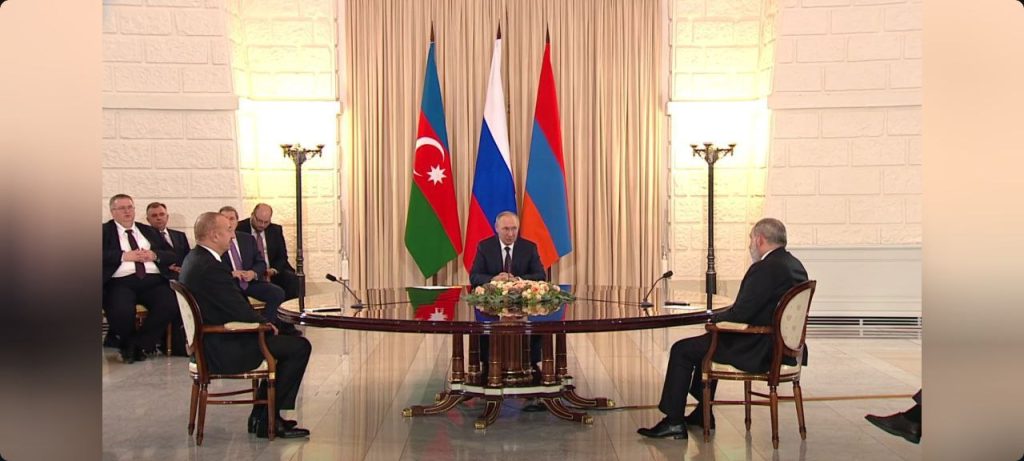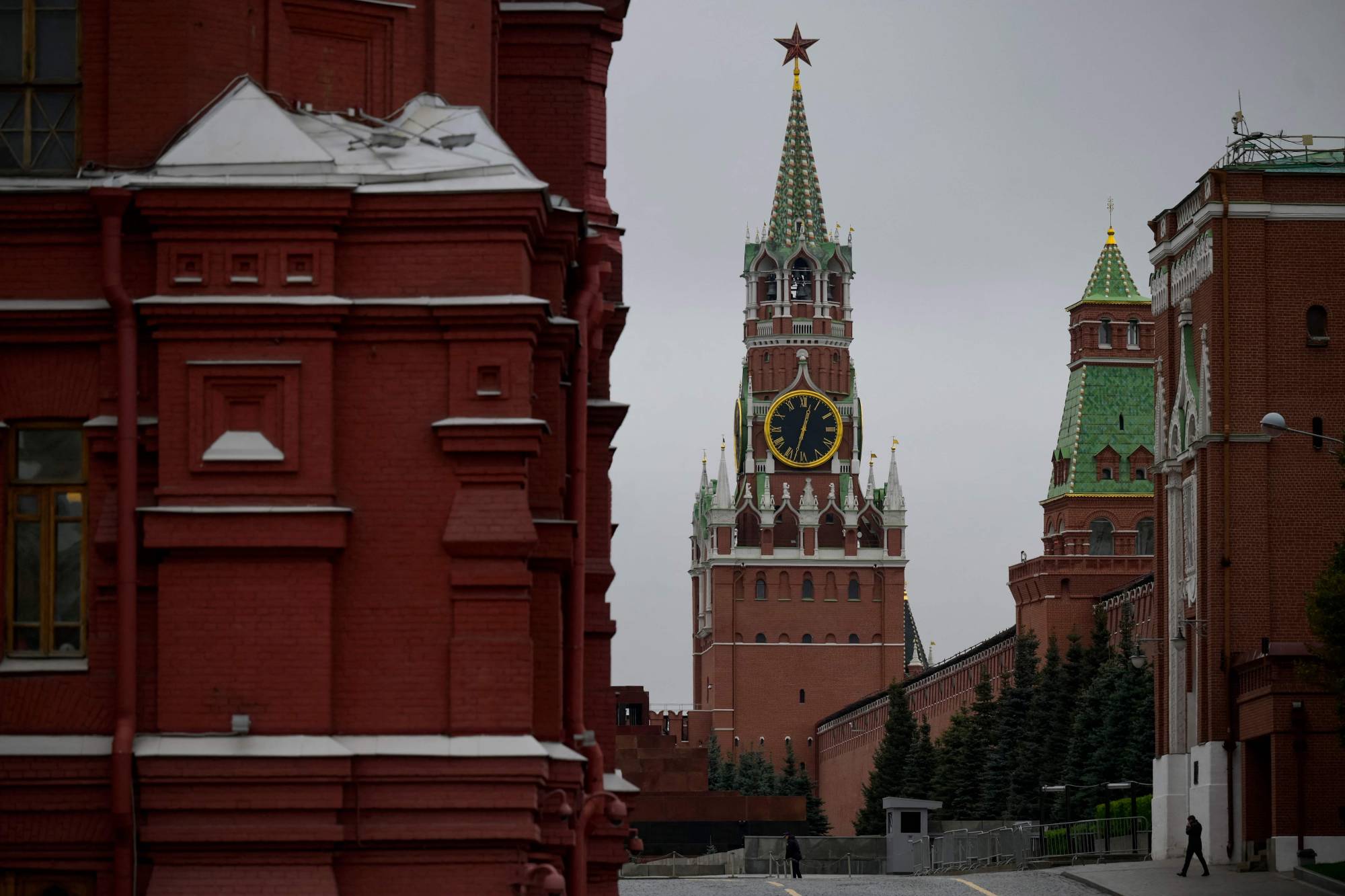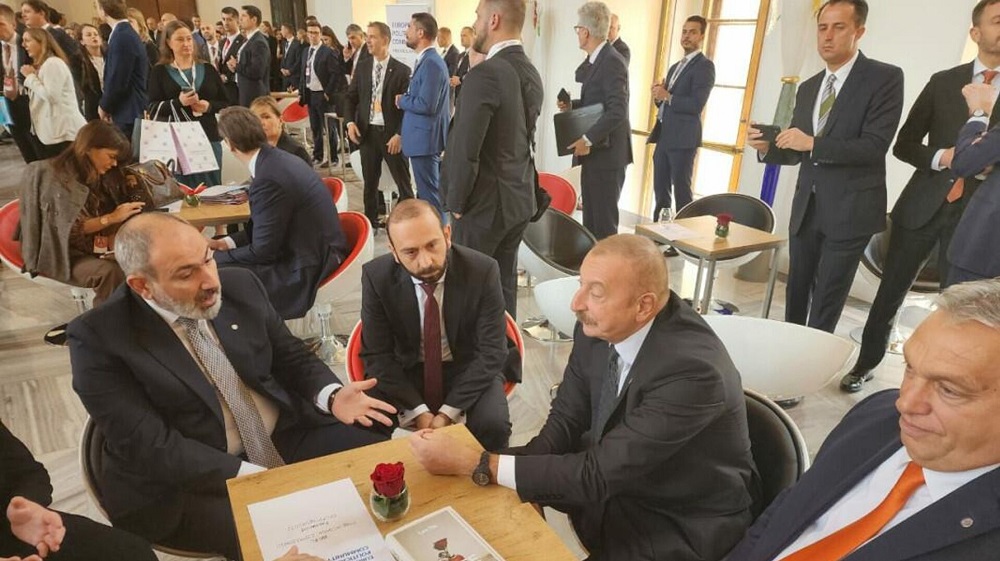Fourth meeting with Putin: did Aliyev and Pashinyan hold their ground?
Fourth Putin-Aliyev-Pashinyan meeting
Another trilateral meeting between the leaders of Russia, Azerbaijan and Armenia took place in Sochi.
At the end of the meeting, which lasted more than two hours, Putin stated that
- The Russian Federation will do everything to achieve a final resolution between Armenia and Azerbaijan,
- The Russian Federation remains in contact with Armenia and Azerbaijan in order to continue the dialogue and put an end to the conflict in the region.
A tripartite statement was adopted in which significant decisions were made. It seems that Nikol Pashinyan and Ilham Aliyev each have their own opinion.
What the President of Azerbaijan and the Prime Minister of Armenia expected from the talks in Sochi and what they talked about with Putin in a bilateral format, the substance of the agreement, and expert commentary.
- “If Armenia accepts the Russian plan, will the Kremlin guarantee security?” – Pashinyan
- Russia does not recognize Azerbaijan’s sovereignty over Karabakh – comments from Baku
- Two different responses from Armenia to Putin’s statement. What’s happening?
Prior to the trilateral meeting Putin met separately with Armenian Prime Minister Nikol Pashinyan and Azerbaijani President Ilham Aliyev.
Pashinyan: “Armenia is now waiting for a clear position of the Russian Federation”
The meeting between Putin and Pashinyan lasted 2 hours.
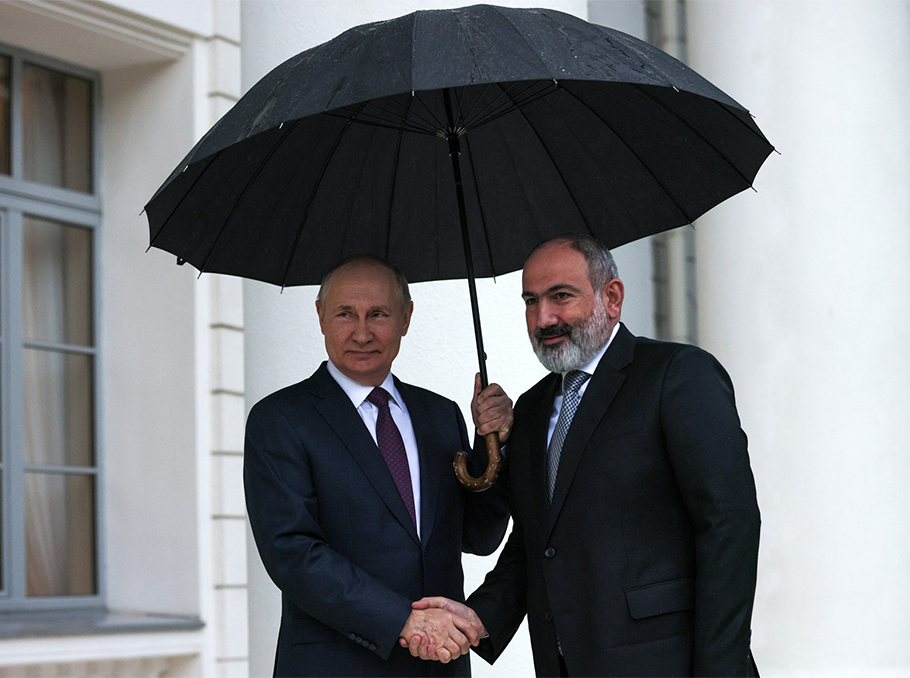
In his opening speech, Pashinyan stated that he wanted to focus on the topic of regional security and listed all the issues of concern to Armenia.
In particular, he talked about the peace treaty and its Russian version, which Pashinyan declared acceptable to Armenia but with a caveat — Russia “must support its proposals” at the same time. Apparently, the prime minister had in mind guarantees from Russia about its readiness to fulfill its obligations under this project.
Pashinyan then presented Putin with a list of Armenia’s demands and Russia’s unfulfilled obligations:
- The issue of the withdrawal of Azerbaijani troops from the zone of responsibility of Russian peacekeepers in Nagorno-Karabakh, where they invaded in March 2022
This refers to the loss of territories near the village of Parukh and the strategically important Karaglukh heights (in Azerbaijan called Dashbashi). According to former commander of the Nagorno-Karabakh Defense Army Samvel Babayan, the Russian peacekeepers proposed to remove both Armenian and Azerbaijani positions from this territory in order to reduce tension, but the agreement was fulfilled only by the Armenian side. The Azerbaijani Armed Forces, taking advantage of the situation, advanced into this territory. Russian peacekeepers offered no resistance – JAMnews.
Pashinyan stressed that “contrary to agreements at the highest level,” the Azerbaijani Armed Forces did not withdraw to their original positions.
- The process of border delimitation between Armenia and Azerbaijan
According to Pashinyan, Armenia has repeatedly stressed that the work of the delimitation commissions should be preceded by the creation of mechanisms to increase the level of stability and security on the Azerbaijani-Armenian border. Russia’s position was that the very formation of the commission would become a mechanism for border security.
“We did not share this position, but decided to rely on the interpretation of our strategic ally, Russia. Despite this, on September 13, Azerbaijan initiated a new large-scale aggression against Armenia and occupied new territories,” he said.
Armenia is now waiting for a clear position from the Russian Federation on this issue “with the wording of the need for the withdrawal of Azerbaijani troops to the positions as of May 11, 2021”, when the first invasion of Armenia took place.
- Unblocking regional transport
Pashinyan stressed that Armenia is very interested in this issue and is ready to make concrete decisions according to the tripartite agreements of November 2020 and January 2021.
“The essence of the issue is that the communications that pass through the territory of the Republic of Armenia should be under its full control and operated in accordance with the legislation of Armenia,” he said.
Thus, he actually demanded that an extraterritorial corridor through the south of Armenia, which Azerbaijan is seeking, be taken off the table.
- The issue of the release and repatriation of all citizens of Armenia held in Azerbaijan
The Prime Minister of Armenia stressed: “Despite the fact that we have discussed this issue dozens of times and contrary to the tripartite statement of November 9, 2020, the issue has not yet been resolved.”
In the end, however, he thanked Putin for his efforts to bring peace, stability and security to the region.
Commentary from Yerevan
Political scientist Areg Kochinyan stated in advance that “nothing positive should be expected from the meeting in Sochi.” He believes that in Sochi, “the torpedoing of a western demarcation is taking place and a Russian demarcation operation is being carried out instead”:
“It seems that there is an agreement on demarcation by the end of the year, and if now the Russian Federation is trying to nullify it and advance its agenda, then it also hits the West’s ability to work on the peace process.”
As for Nagorno-Karabakh and Putin’s statement that, allegedly, according to the “Washington” proposal of a peace treaty it is the territory of Azerbaijan, Kochinyan says:
“Putin’s entire speech at the Valdai discussion club on this topic was highly manipulative, both in relation to the analysis of the current situation and in relation to the past. When he says that he offered to give five regions to the Armenians and live in peace, it seems that all parties were constructive, and only the Armenians stubbornly did not want to give five regions. Ex-President of Armenia Serzh Sargsyan said earlier that he was ready to give up five regions in exchange for a status and a peace treaty. And it was Azerbaijan that refused to make any concessions in exchange for five regions. So we are well aware of the trend of shifting political responsibility to Yerevan.”
Aliyev: “Karabakh conflict is already history”
After talks between Putin and Armenian Prime Minister Nikol Pashinyan, a similar meeting between the Russian President and Ilham Aliyev took place.
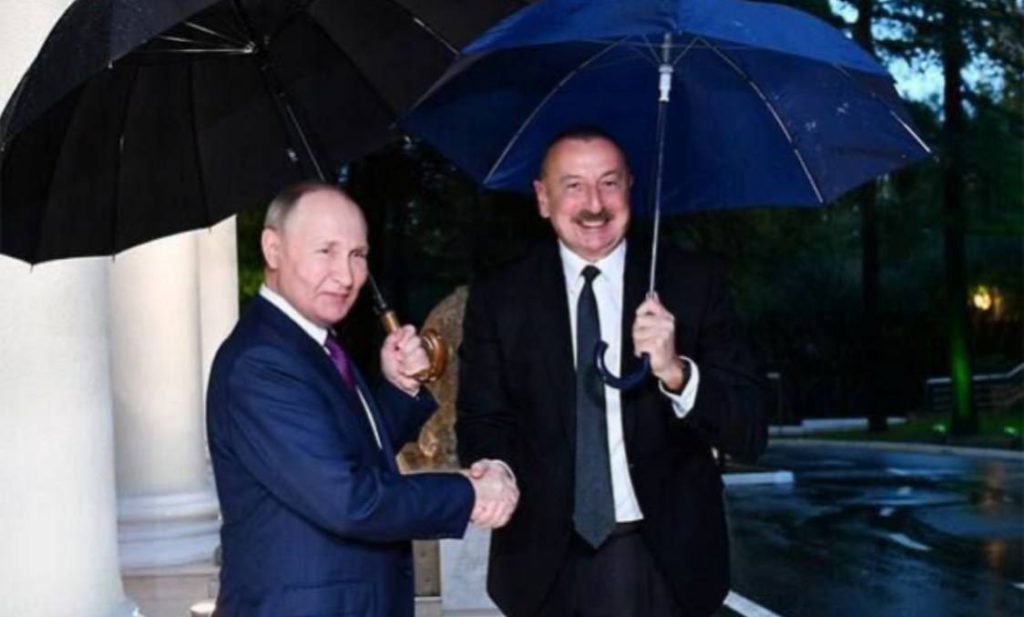
In the part of the meeting open to the press, Aliyev noted the “positive dynamics” of bilateral relations between Azerbaijan and Russia.
Aliyev stated that the time has come to speak and act towards the normalization of relations between Azerbaijan and Armenia:
“Relatively recently, Azerbaijan put forward five basic principles on which relations between Azerbaijan and Armenia should be normalized. These are the fundamental principles of international law, and I think that normalization can be achieved on this basis.”
Touching upon the Karabakh problem, the Azerbaijani leader stressed that this conflict “is already history, it was resolved two years ago, so there is practically nothing to discuss in this context.”
In his response speech, Vladimir Putin noted that “it will be necessary to talk about the situation that has developed today, to look for ways to resolve issues that have not yet been resolved.”
Comment from Baku
“The meeting can be added to the assets of Azerbaijan”
The fourth meeting between Aliyev and Pashinyan in Russia again failed to yield tangible results, Azerbaijani political observer Mais Kasumov said in a commentary for JAMnews after the meeting.
According to Kasumov, in the final statement of the meeting “there is not a single novelty which would be worth talking about.”
“Yes, for the first time in meetings with Putin, the parties agreed on the supremacy of the Alma-Ata documents of 1991, which was already discussed in Prague. It can be assumed that the delimitation of borders will still be carried out according to maps of exactly 31 years ago.
Although this may be just a statement of fact, because after the Prague meeting the parties were already conducting intensive negotiations on the delimitation of borders, and Russia had no choice but to declare them.”
Kasumov emphasizes the absence of any wording on Karabakh in the document:
“In Aliyev’s speech before the meeting with Putin, there was a hint that Azerbaijan was not going to discuss the issue of Nagorno-Karabakh, because for Baku it is resolved.
Apparently, Putin had to agree with Aliyev’s arguments, which is easy to guess from the words of the Russian leader that some parts of the agreement had to be removed from the final version of this document. It seems to me that we are talking about Karabakh here.”
This meeting, given the absence of a paragraph on Karabakh, can bthus e added to Azerbaijan’s assets, Kasumov believes.
“But again, there are no exact wordings, there is no solution of other acute issues between the parties. And it is difficult to call this statement some kind of achievement. In fact, they left everything as it is,” he concluded.
TEXT OF THE TRIPARTITE STATEMENT
We, the President of the Republic of Azerbaijan I.G. Aliyev, the Prime Minister of the Republic of Armenia N.V. Pashinyan and the President of the Russian Federation V.V. Putin, met on October 31, 2022 in Sochi and discussed the implementation of the tripartite statements of November 9, 2020 of the year, January 11 and November 26, 2021.
We reaffirmed our commitment to strict observance of all these agreements in the interests of the comprehensive normalization of Azerbaijani-Armenian relations, ensuring peace, stability, security, and sustainable economic development of the South Caucasus. We agreed to make additional efforts aimed at urgently resolving the remaining tasks, including humanitarian issues.
Noting the key contribution of the Russian peacekeeping contingent to ensuring security in the zone of its deployment, we emphasized the relevance of its efforts to stabilize the situation in the region.
We agreed to refrain from the use of force or the threat of its use, to discuss and resolve all problematic issues solely on the basis of mutual recognition of sovereignty, territorial integrity and inviolability of borders, in accordance with the UN Charter and the Alma-Ata Declaration of 1991.
We stressed the importance of active preparation for the conclusion of a peace treaty between the Republic of Azerbaijan and the Republic of Armenia in order to achieve sustainable and long-term peace in the region. On the basis of the existing developments, it was agreed to continue the search for mutually acceptable solutions. The Russian Federation will render all possible assistance therein.
We emphasized the importance of creating a positive atmosphere between the Republic of Azerbaijan and the Republic of Armenia to continue the dialogue between representatives of the public, expert communities and religious leaders with Russian assistance, as well as launching trilateral inter-parliamentary contacts in order to strengthen trust between the peoples of the two countries.
The leaders of the Republic of Azerbaijan and the Republic of Armenia welcomed the readiness of the Russian Federation to continue to contribute in every possible way to the normalization of relations between the Republic of Azerbaijan and the Republic of Armenia, ensuring stability and prosperity in the South Caucasus.
